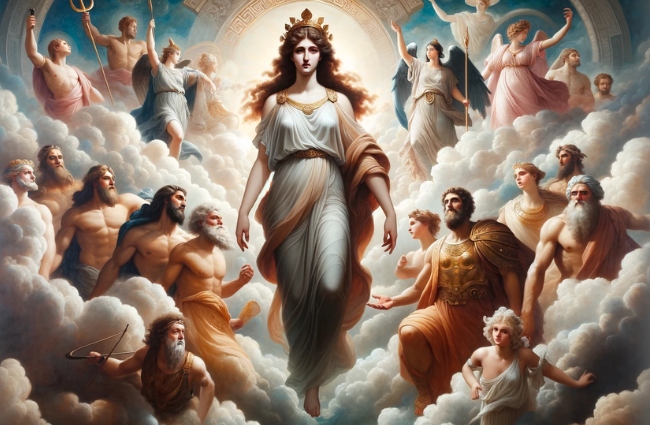Home » Hera’s Personality: Her Character Traits, Jealous Ways & More
Hera’s Personality: Her Character Traits, Jealous Ways & More
She’s no ordinary goddess. She’s fierce, regal, and insanely jealous.
Hera’s personality was a mix of strength, loyalty, and a heavy dose of vindictiveness.
She can be fiercely protective of her marriage and unyielding in her pursuit of justice.
Her husband’s infidelities are why she was jealous of other women so often.
However, she did have some good qualities.
For example, one of the core aspects of Hera’s character traits is her role as a guardian of women, marriage, and childbirth.
This made her a central figure in any narrative concerning family dynamics.
That’s why, despite her stern austerity, many still turned to her for support in matters of family and childbirth.
The rest of this blog post describes all the Hera personality traits and whether she was good or bad in Greek mythology.
Let’s begin…
List of Hera Personality Traits

In the realm of Greek gods and goddesses, appearances can be deceiving.
Hera’s personality in ancient mythology is like a tempestuous sea—calm on the surface but with turbulent currents beneath, ready to unleash storms when provoked.
Her temperament was a mix of regal dignity, fierce protectiveness, and a tendency toward jealous vengeance.
Especially in matters concerning her husband Zeus’s many infidelities.
Here’s the character traits of Hera as exhibited in the ancient writings about her:
1. Protective and Maternal: She is deeply protective of her marriage and often seeks to uphold the sanctity of this institution. This protectiveness extends to women and families, reflecting her role as the goddess of marriage and childbirth.
2. Regal and Authoritative: As the Queen of the Gods, she exhibits a commanding presence, often involved in the governance of the divine and the enforcement of justice among gods and mortals alike. Her authority is marked by her protective nature over marriage and women, aligning her actions with her values and responsibilities.
3. Jealous and Vindictive: One of the more notable personality traits of Hera Goddess of Olympus, is her jealousy. She often takes drastic measures against Zeus’s lovers and their offspring. Her vendetta against Hercules, a son of Zeus with another female, is one of the most well-known stories of her wrath and manipulative ways. She disliked infidelity with a passion and went after those who were involved directly or indirectly.
4. Strong-Willed and Determined: Her resolute nature drives her to pursue her goals relentlessly, whether it’s upholding the sanctity of marriage or seeking justice for perceived wrongs. This character trait often leads her to confront even the most formidable obstacles without hesitation. Her determination can sometimes transform into vengefulness, leading to complex outcomes that shape many Greek legends.
5. Loyal and Committed: Despite the numerous challenges in her marriage, Hera’s personality shows a profound sense of loyalty and commitment to Zeus and the Olympian order. This loyalty is pivotal in many myths, showcasing her as a figure who, despite personal grievances, often acts in the interest of divine and earthly harmony.
In Greek mythology, she stands as one of the most intriguing figures among the Olympian gods. Known for her strength and unwavering determination, she is often portrayed as a formidable and sometimes unpredictable force.
These Hera character traits make for a complex deity, revered, and feared, embodying the challenges and responsibilities of her elevated position in ancient mythology.
Hera’s Personality Type

If we were to analyze Goddess Hera’s personality type through a modern psychological lens, her behaviors might suggest features that align with certain psychological disorders,
In particular those involving emotional regulation and interpersonal relationships.
For instance:
• Narcissistic Personality Disorder: Her need for admiration and her perception of herself as deserving of special status might mirror traits of narcissism. She reacts to threats to her self-esteem with anger or humiliation, particularly in response to Zeus’s deceptive ways.
• Borderline Personality Disorder: Some of her actions, such as her intense emotional outbursts and punitive measures against those she feels have wronged her, could be seen as symptomatic of borderline personality disorder, characterized by emotional instability, feelings of emptiness, and fears of abandonment.
• Paranoid Personality Disorder: Her general mistrust and suspicion of others’ motives, particularly concerning Zeus and his other relationships, could suggest paranoid character traits.
Moral complexities and human-like behaviors are prevalent among the gods.
So interpretations of Hera’s personality are subject to debate and should be understood within the cultural and symbolic contexts of Greek mythology.
Why Was Hera Often Jealous?
As you might know by now, Hera was often jealous of others in the Greek pantheon and beyond. It was a well known aspect of her personality.
But why? Several factors contribute to this:
1. Zeus’s Infidelities: Zeus was notorious for his numerous romantic escapades with both goddesses and mortal women. Each affair not only undermined her position as his wife but also challenged the sanctity of marriage that she was supposed to uphold. Her reaction to Zeus’s infidelities often involved exacting revenge on his lovers and any offspring from these liaisons. This was the main reason why Hera was jealous of other goddesses and mortals.
2. Protection of Marriage: As the goddess tasked with overseeing marriage, she held a deep commitment to the institution of marital fidelity. Zeus’s frequent unfaithfulness represented a direct affront to what she embodied and protected, making her reactions intense and sometimes extreme.
3. Desire for Respect and Power: She was not just Zeus’s wife but also a queen among the gods. Her status demanded respect, which was compromised by Zeus’s disregard for their marital vows. Goddess Hera’s actions can be viewed as attempts to reclaim her dignity and assert her power within the pantheon.
4. Personal Insecurities: Some interpretations suggest that her envy could also reflect deeper insecurities, possibly about her desirability or her position as Zeus’s wife. Each of Zeus’s affairs might have felt like a personal slight, exacerbating her feelings of betrayal and hurt.
5. Cultural Reflection: Her envious ways might also reflect cultural attitudes towards marriage and fidelity prevalent in ancient Greece, emphasizing the expected loyalty of a wife despite the behavior of her spouse. She embodies these ideals, and her reactions are portrayals of the societal expectations of women’s roles and rights within marriage.
These are the 5 main reasons why Hera was often jealous in the stories told about her.
The vengeful nature she displayed came to define her character, creating tension among the gods and shaping many tales.
Was Hera Good or Bad?
In Greek mythology, Hera isn’t easily classified as purely good or bad.
Her character reflects a complex blend of traits that make her both revered and feared.
Take a deeper look at the good and bad things about her personality, then decide for yourself whether Hera was an evil goddess or not.
Good qualities: She is seen as the goddess of marriage, family, and childbirth, roles that suggest nurturing and protective qualities.
She is loyal to Zeus and shows deep concern for the institution of marriage. Her support for traditional values in ancient Greek society adds to her positive aspects. Generally, she was a good mother too. All of these make up her good qualities.
Bad qualities: Her jealousy and vindictiveness often lead her to do some bad things, especially towards Zeus’s lovers and kids. Her spiteful ways also led her to sabotage mortal and immortal lives, making her one of the most feared goddesses in Greek pantheon.
Worst Thing Hera Did: Her most notorious act of revenge in Greek mythology was her relentless persecution of Hercules. Angered by Zeus’s infidelity, she drove Hercules into a fit of madness, causing him to kill his own wife and children. This tragic event set the stage for his legendary Twelve Labors as penance. This is probably her worst deed, although she had many unkind acts. See more Hera myths.
Her motivations are rooted in maintaining order and loyalty to her marriage, yet her methods can seem harsh.
Her protective nature for marriage and family can drive her to extremes. This leads to her being seen as having a bitter personality.
Deciding whether Hera was good or bad in Greek mythology comes down to the eye of the beholder.
Conclusion of Hera’s Personality
Hera’s personality traits were like a tightly coiled spring—calm and composed on the outside, but capable of sudden, explosive reactions when released.
As the Queen of the Greek Pantheon, she embodies regal authority and unwavering commitment to her role.
Yet, her deep loyalty to marriage contrasts with her fierce jealousy, often leading her down a path of retribution and vengeance.
This complicated nature is what makes her stories compelling and her character so unforgettable.
Hera character traits, whether nurturing or vengeful, reflect the struggles and challenges inherent in any relationship.
She stands on her own, with a persona that continue to resonate through art, literature, and popular culture.
Her enduring presence in mythology reminds us that complexity and depth are what make a character truly unforgettable.
Understanding Hera’s personality provides a unique perspective on the cultural values of ancient Greece, particularly regarding marriage and the expectations placed on women in high places of influence.
Table of Contents
2024 All rights reserved.
